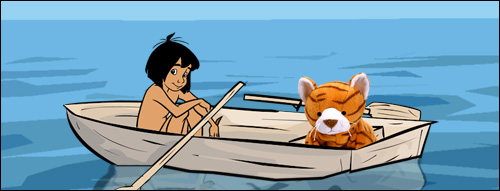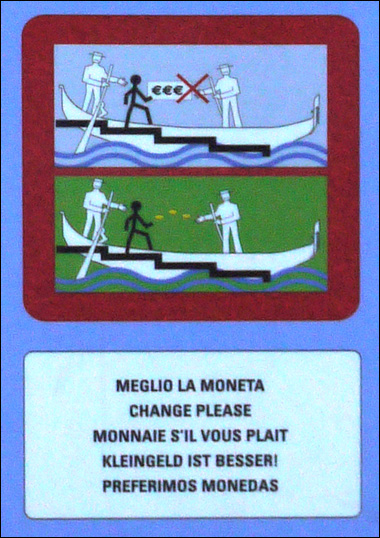Wed 27 Mar 2013
The Lie of Pi
Posted by anaglyph under Atheism, Books, Movies, Philosophy, Religion, Skeptical Thinking
[10] Comments

Like a bunch of other people I recently saw Ang Lee’s screen interpretation of Yann Martel’s Life of Pi. I thought the film was pretty good – a decent cinematic imagining of the tale, even if it did gloss over some of the subtleties of the book. ((…and lean a little too heavily on other not-so-subtle things…)) That’s the legacy of cinema of course – commercial pressure sees to it that any idea, big or small, must be squashed into a two or three hour format no matter what the consequence to the idea. But this is not going to be one of my film reviews, you will be pleased to hear. Instead, I want to talk about the premise of the story of Life of Pi itself, and why I think its pop wisdom coda is curiously diffuse and widely misinterpreted.
[Spoilers: To make the point of my post I must necessarily relate plot details and give away the ending, so if that bothers you, you probably should stop reading now.]
The framework for the novel relies on a conceit that has an anonymous narrator relating an incident in which he meets an elderly man who offers to tell him a story fantastic enough to give him faith in God. By inference, we, the reader will also become convinced enough by this wondrous affair when it is revealed to us, to adopt faith in God ourselves. ((In the movie, the narrator is personified as a young novelist looking for a story and it is an older Pi who offers to provide the justification for faith. This whole mechanism seems tacked-on and clumsy, and exists solely as a setup for the flimsy ‘gotcha’ moment in the finale. When I read the book it tainted the whole experience for me, because I was constantly waiting for the whammy. It would have been SO much more elegant without it, and seems like such an awful high-school flub that I’m totally surprised that it wasn’t heavily criticized. It would have lent the story an ambiguity – indeed, a point – that certainly wouldn’t have prompted a gushing letter from Barack Obama. I can’t say exactly why, but the mechanism was more irksome in the film. It’s been several years since I read the book, so maybe I’m just more touchy on the subject these days…))
The rest of the tale is then told in the first person voice of Piscine Patel – the eponymous ‘Pi’ – and concerns the adventures that ensue when his father, a zookeeper, is forced to close the family menagerie and sell the animals to other zoos around the world. As the story sets out, we learn of a young Pi’s attempts to make some sense of the religions he reads about in school. His efforts to square those beliefs with the harsh lessons of nature he witnesses among the animals in the zoo culminate in him taking the unusual step of adopting Christianity, Hindi and Islam all together – because he can’t see that any one of these doctrines by itself is exclusively of merit. And still, we sense, he is not happy. It sets Pi apart as a curious and conflicted boy, searching for answers that come neither from his rationalist meat-eating father or from his religious vegetarian mother. ((Yes, when you put it like that, it does seem rather heavy-handed, doesn’t it? But I’m just telling it like it is.)) The main part of the story takes place when the family set off to Canada via ship, to escort the last of the zoo animals to their new home. The voyage doesn’t go well, and the ship sinks in bad weather, eventuating in the death of Pi’s family and all the animals save a zebra, a hyena, an orangutan and the memorable ‘Richard Parker’ – a Bengal tiger – the four of whom end up adrift in a lifeboat with Pi. The hyena, zebra and orangutan don’t last long for various reasons and what then ensues is a highly improbable fantastic journey, in which Pi trains Richard Parker not to eat him and the two companions witness all manner of marvels including phosphorescent sea creatures, great flocks of flying fish and a carnivorous island inhabited by meerkats. It’s a sweet and engaging tale.
Yann Martel intends it to be more than simply that, though. Navigating past assorted obstacles that are mostly philosophical and/or religious feints that are, unfortunately I think, never really addressed or resolved, Pi and Richard Parker become ever more desperate, until at last, dehydrated and starving, they are washed up on a Mexican beach. Richard Parker immediately vanishes into the jungle with nary a tip of the cap or a cheerio, and Pi is rescued by some itenerant fishermen. On his recovery, he is obliged to undertake an interview with Japanese officials attempting to discover the cause of the disaster which shipwrecked him. Quite understandably, they find his tale completely implausible, and so he tells them another more brutal human story in which, instead of animals, some members of the crew and his mother end up in the lifeboat. They all die in unpleasant but probable ways, and the Japanese investigators draw the conclusion that Pi’s first story is an allegorical recounting of what really happened.
‘But which story do you prefer?’ asks Pi.
The investigators choose the version with the animals.
Pi thanks them and says, ‘And so it goes with God.’
In 2010 Barack Obama wrote a letter directly to Yann Martel, describing Life of Pi as ‘an elegant proof of God, and the power of storytelling’. It makes me wonder whether President Obama read the same book as I did, and if so, where the ‘proof of God’ actually was, because it seems to me that it’s the very antithesis of that. ((Even now, I am compelled to wonder if Martel intended to write an endorsement of atheism but chickened out at the last minute – for, without the framing story, that’s exactly how you would read Life of Pi.))
It bothers me deeply that people seem to have read the story in this way. Life of Pi provides no compelling argument for someone to take up faith in God (which was the promise made by our narrator in the beginning, as you will recall). Nor, indeed, does it advance any kind of advocacy for religious belief. ((You could argue that the island with the meerkats is an allegorical criticism of organised religion, in fact.)) Sure, it indisputably does offer up a wonderful poetic vision of why it would be nice to think that God exists, but just look at that coda: ‘Which version’ asks Pi ‘…do you prefer?’ Isn’t that as plain as day?
Of course we all prefer the story with the tiger and the magical luminous creatures and the spooky island ((Although I feel I must point out that there are undoubtedly writers who could have made the other story as equally compelling, compassionate and poignant if they’d turned their hands to it. It’s another conceit of the novel – in pursuit of its high moral ground – to paint reality as something that is distasteful, miserable and undesirable.)) – but preferring it makes it neither true nor illuminating. It just means it is a nice story. In the event, Pi’s journey has no material significance as far as the Japanese officials’ investigation is concerned, so a fictional recounting is neither better nor worse than the truth for the purposes of their report.
With this in mind, a sensible person would surely interpret the message of the book as: Believe whatever makes you feel good as long as you understand that it has no relevance to real life. To accept that this holds any kind of profundity, though, is as absurd as saying that it’s rational to discard the truth for fanciful ideas about Santa Claus, or elves, or the Tooth Fairy, simply because all those are preferable stories. These are concepts we entertain when we are children; fantasies that are quite harmless in the protected realm of childhood but which break down when confronted with rational scrutiny. People who still believe – literally – in the Tooth Fairy into their adulthood tend to have a lot of trouble dealing with the real world. ((Indeed, people who hold ‘religious’ beliefs that don’t square with the endorsed and accepted ones face exactly this problem too. You’re an Aetherian? Seriously? [woooo-eee-oooo]))
In addition, and perhaps more gratingly, this conclusion – that choosing to believe in a nice story is preferable to committing to actual reality – sells the alternative short. It diminishes the wondrous nature of the universe by squashing it under the squalor of the worst aspects of humanity. Pi’s alternative narrative is an unpleasant and uncomfortable one, evoking as it does all the terrible (animal) traits of human beings. It’s certainly not a story someone would ‘prefer’ to live through, but it is the story we are obliged to live through. The obvious takeaway for most people seems to be that the lively fantasy version of the tale, with its more-than-human animals is somehow truer to the way humans ‘really’ are. It’s a familiar hubristic 19th century Judaeo-Christian worldview. Despite its 21st century multicultural pretensions to a lofty spiritual philosophy Life of Pi veritably reverberates with the echoes of the fairytales of Rudyard Kipling and A. A. Milne. Religious thought has ever been like this. It wants to hijack the noble parts of humanity and make a claim on them, whilst distancing itself from the bestial, the venal and the mortal, but the fact is that we humans will never truly be on the path to a worthwhile future as long as we try to set ourselves apart from nature. We can simply ignore what we’re really like or we can attend to it and attempt to address the bad bits. It is a magnificent talent that we can make up colourful and imaginative stories, but we should never, ever, start preferring to believe in them to the detriment of seeking real, touchable, relevant knowledge.
Unless, of course, the consequences actually don’t matter. Then go ahead and believe anything you want.




